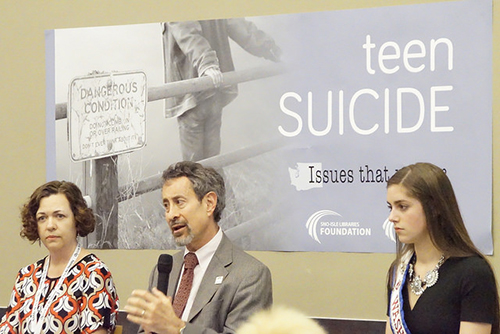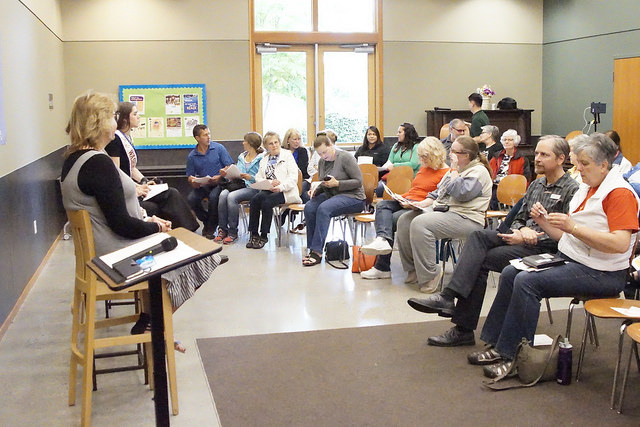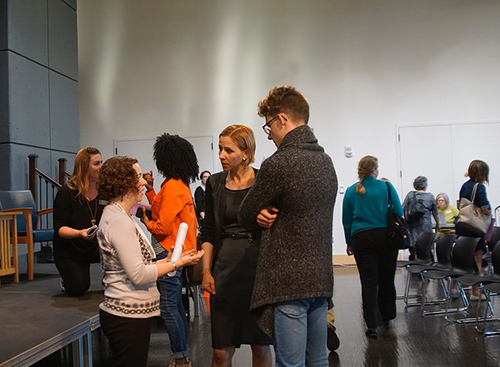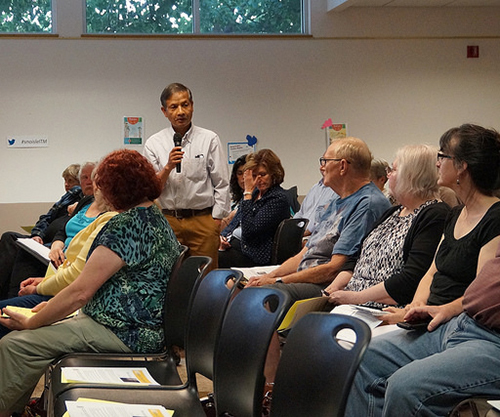Forums Facilitate Important Community Conversations
 This past summer my library system, Sno-Isle Libraries, held a series of four community forums on the topic of teen suicide throughout the two-county library district we serve in western Washington; this was the 12th topic around which we'd created a series of forums as a part of our Issues That Matter programming series. The Issues That Matter series has been a regular part of the programming in our library district since 2010, and its purpose is to facilitate important community conversations on high-profile, current event topics.
This past summer my library system, Sno-Isle Libraries, held a series of four community forums on the topic of teen suicide throughout the two-county library district we serve in western Washington; this was the 12th topic around which we'd created a series of forums as a part of our Issues That Matter programming series. The Issues That Matter series has been a regular part of the programming in our library district since 2010, and its purpose is to facilitate important community conversations on high-profile, current event topics.
Issues That Matter provides a forum for civil, open discussion with the guidance of expert panelists and facilitators, connecting citizens in the communities we serve with local experts, stakeholders and community leaders. Sometimes the topics chosen are in conjunction with a local ballot measure, such as marijuana legalization or marriage equality. Other topics may be less controversial, you won’t find a lot of folks taking a supportive stance on bullying, for instance; but topics like these are selected to provide an opportunity to learn more about problems we're experiencing in western Washington that have a negative impact on our communities, and ways that citizens can support each other and work toward solutions to these issues.
Program Format
The format for a typical program in the series is pretty simple. After a brief welcome and explanation of Issues That Matter and why we do this type of programming, the evening's moderator is introduced. The moderator offers some brief opening thoughts on the topic and then explains how the remainder of the event is organized. An Issues That Matter event is essentially a two-part program; the first section is a series of seven- to ten-minute opening statements given by each member of a panel of three to four experts, followed by a 45- to 50-minute Q & A exchange between audience members and the experts sitting on the panel. After these two core pieces are complete, the panelists are given the opportunity to make brief closing remarks of one to two minutes before the moderator closes the event. Everyone also has a chance to mingle for 15 to 20 minutes before going home.
Making the Case
When we decided that our library district wanted to pursue this type of programming, we knew there would be questions asked. We anticipated receiving questions like, "Libraries check out books, why are you holding community events on ballot measures or social issues like teen suicide, drug abuse and sex trafficking?" Indeed, we did hear that question along with several similar ones, and understandably so; this was uncharted territory for our library system.
It became apparent early that it was very important that everyone in our organization be aware of why we chose to engage in this type of programming and to be able to explain that decision effectively to our customers and community partners. In my library system, building civic engagement to address community issues has been and remains a strategic organizational priority. Factoring in that one of our core services is to "present programs addressing community needs and interests" made this type of programming a no-brainer at Sno-Isle Libraries.
Communicating that message to our staff and customers was critical, but once they heard the message and saw how this type of programming aligned itself with both our core services and our priorities, it all made a lot of sense. Your library district's priorities might lie elsewhere, but if one or more of them are similar to ours, then you may want to give some thought to hosting similar programs, either as a one-time event or as part of an ongoing series similar to Issues That Matter.
"In my library system, building civic engagement to address community issues has been and remains a strategic organizational priority. Factoring in that one of our core services is to 'present programs addressing community needs and interests' made this type of programming a no-brainer at Sno-Isle Libraries."
Planning Considerations
If you decide to move forward with hosting an Issues That Matter style event, there are a few things you should consider when planning. Allow yourself a minimum of three months lead time to properly plan the event, locate and secure participants, and follow through on all the logistical concerns necessary to host a successful forum.
Selecting a topic is very important, but how do you know what to choose? We use several methods, one of which is asking the staff members on our programming team to make a conscious effort to follow local news sources with an eye toward multiple instances of stories on the same topic. Canvassing local elected officials for information on current projects or initiatives and asking if they can share information on concerns they are hearing from their constituents is another possibility. You could survey customers in your community libraries.
In recent years, we have built up enough brand recognition that many people in our communities are aware of the Issues That Matter programming series, so we now send out a press release each year to local news sources soliciting suggestions from the public for the coming year's topics. As the person whose inbox receives all of the replies from that press release, believe me when I say that once the word gets out on what you're doing, you will not be left wanting for input from the community.
After gathering all of this information, our committee sits down and evaluates all the information and suggestions we've collected to determine the two to three topics we'll select for the year's programs. As an example of why we chose teen suicide as our most recent topic, it was one of the most frequently received suggestions from the public, it aligned with one of the major priorities in the largest county in our district's Community Health Improvement Plan, and through local news stories we had seen a rash of teen suicides and suicide attempts in our communities. One of the communities selected to host an event had experienced three suicide deaths at the local high school in the past two school years; another had seen four occur in a similar time span.
Finding a Moderator and Panelists
 Once you have your topic selected, you need to identify and approach panelists and a moderator. This part of the process seems much harder on the surface to complete than it often actually turns out to be. Knowing good sources of potential moderators and forming a partnership with those people and organizations is key, as moderators can often be more difficult to locate than panelists. In the past we've worked with the League of Women Voters and local media outlets to provide a moderator comfortable leading a discussion. Local elected officials are another good resource; more than one mayor in a hosting community has been excited to serve in this capacity at one of our forums. Alternately, if your library is invested in the idea of a continuing series of events, it might be worth having a staff member receive training on moderating events; this person could then serve as the moderator at any future events held.
Once you have your topic selected, you need to identify and approach panelists and a moderator. This part of the process seems much harder on the surface to complete than it often actually turns out to be. Knowing good sources of potential moderators and forming a partnership with those people and organizations is key, as moderators can often be more difficult to locate than panelists. In the past we've worked with the League of Women Voters and local media outlets to provide a moderator comfortable leading a discussion. Local elected officials are another good resource; more than one mayor in a hosting community has been excited to serve in this capacity at one of our forums. Alternately, if your library is invested in the idea of a continuing series of events, it might be worth having a staff member receive training on moderating events; this person could then serve as the moderator at any future events held.
As far as panelists are concerned, I've found that outreach is often an important part of many professionals' jobs, and, surprisingly enough, they often don’t receive a lot of invitations to speak at events. It may seem odd or scary to "cold call" people or send out unsolicited emails about participating in a library program, but it's often as simple as identifying a few key agencies in your community, and simply making the effort to tell them about your planned event, asking if they want to send a representative to participate.
I've experienced panelists who will help refer and/or arrange colleagues for panels quite frequently. Often people are so excited that there are more available speakers than there are spots on the panel, and that's okay, too. Extra stakeholders often sit in the audience and participate in the Q & A, frequently supplementing the answers given by the panelists themselves.
One panelist at our teen suicide events, who was extremely excited about participating and after being asked immediately committed to all four events scheduled, reported that "in 20 years, I have not been approached to speak at an event before the library asked. I've always had to ask organizations if I could come talk to them!" Not surprisingly, she did an amazing job and has since gone on to do other programs in our library system at additional locations to help educate communities on what they can do to lessen the risks of teen suicide and support the youth in their communities.
"People want to support their communities, they want to work with their libraries, and they want to help others ... they just need to be asked to do so!"
Program Costs
You can often create some amazing partnerships simply by not being afraid to reach out to others. Also of note, we do not offer a speaker's fee or honorariums to panelists or moderators, and this has never been an issue in six years. We do provide a light meal beforehand as a courtesy and to encourage speakers to arrive early to chat with each other and to do a sound check with our recording equipment and microphones. We also offer mileage reimbursement, but we've only ever had two participants take us up on that! The Sno-Isle Libraries Foundation supports the events by covering these costs, along with equipment rental, if it is needed. These are the only costs incurred during our Issues That Matter programs. People want to support their communities, they want to work with their libraries, and they want to help others ... they just need to be asked to do so!
Event Logistics
 Before the day of the program you will want to connect your panelists with each other and the moderator so they get a chance to discuss what each will be focusing on in their opening statements. They appreciate a chance to avoid making overlapping statements, and often want to discuss how certain potential questions might be addressed and by whom. A few emails are usually enough to accomplish this. I also share links to recordings of past events along with an itinerary.
Before the day of the program you will want to connect your panelists with each other and the moderator so they get a chance to discuss what each will be focusing on in their opening statements. They appreciate a chance to avoid making overlapping statements, and often want to discuss how certain potential questions might be addressed and by whom. A few emails are usually enough to accomplish this. I also share links to recordings of past events along with an itinerary.
A typical program schedule looks like this:
3:30-4:00 p.m. Staff arrive at event site to set up microphones, stage and audience area, and recording equipment if we are recording video of this event.
5:00-5:10 p.m. Light meal is served; panelists and moderator may begin arriving.
5:45 p.m. Requested deadline for participants to arrive in order to prep for final sound check.
6:00 p.m. Sound check and final equipment tests.
6:30 p.m. Event begins, welcome by library leadership (typically our library director/deputy director and a board member).
6:35 p.m. Moderator introduced and gives opening remarks.
6:40 p.m. Panelists give opening statements.
7:05-7:10 p.m. Q & A session.
7:55 p.m. Closing remarks from panelists and moderator.
8:00 p.m. Event concludes and audience and participants are encouraged to mingle for 15 to 20 minutes.
Advice for Beginners
Keep your communications lines open and your event will be a success. You don't have to know all of the answers before embarking on this type of programming adventure. We certainly did not have them all when we had this idea and decided to move forward, but rather learned many things through the process each time we took on a new series of events, constantly tweaking things like the format, stage layout and presentation.
Surveying attendees after the event (both audience members and participants) was also important in helping us continue to improve the series, something we still do each time we tackle a new topic.
We also rotate staff who are committee members and the leadership on the Issues That Matter team regularly in order to keep the ideas fresh, the staff excited and to promote diversity in viewpoints. I was the second committee lead for Issues That Matter and will be cycling off the committee after we tackle the topic of Homelessness Here in early 2017.
I am excited to see this important programming series continue to grow and improve under the leadership of a colleague who has worked closely with me over the past year and has her own vision and ideas to help Issues That Matter continue to educate and connect members of the communities in our library district, and have an impact on the lives of our customers. I encourage you to consider doing something similar in your library!
Do you have more questions about how to hold this type of programming at your library? Contact Charles W. Pratt, Managing Librarian, Sno-Isle Libraries at [email protected].
Photos:
1. Panelists at the June 23, 2016, Teen Suicide Forum at Snohomish Library were (l to r) Rena Fitzgerald, Crisis Chat Senior Program Manager, Volunteers of America Western Washington; Dr. Gary Goldbaum, Health Officer and Director, Snohomish Health District; Megan LaPlante, Miss Washington High School America 2016 winner and Monroe High School student.
2. An attendee asks a question at the Oak Harbor Library Teen Suicide Forum on July 21, 2016.
3. The room at the June 23, 2016, Teen Suicide Forum at Snohomish Library.
4. Each event includes time for panelists and attendees to mingle; here patrons talk after the Teen Suicide Forum at Rosehill Community Center on July 13, 2016.
All photos courtesy of Sno-Isle Libraries.
Teen Suicide: An Issues That Matter Forum
In summer 2016, Sno-Isle Libraries hosted four public forums about the causes, scope and prevention of teen suicide in Snohomish, Stanwood, Mukilteo and Oak Harbor, WA.
To learn more about the Teen Suicide Forums, visit the program page on the Sno-Isle Libraries website.
There you will find a video of the forum held in Mukilteo, WA, event recaps, photos and participant lists from the three additional forums, as well as selected library materials, research resources and online resources.

